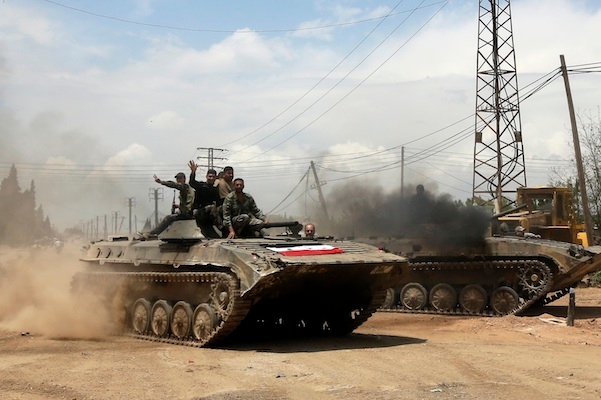Syria is sliding rapidly into chaos. The supply of weapons to the opposition could only make matters worse, yet the Prime Minister seems to be -contemplating it.
We have misjudged the situation from the start. From the early days of the crisis, two years ago, we rode to the rescue with our rhetoric. We were all for the forces of democracy and for the downfall of a ruthless dictator. Syria was another green shoot of the Arab Spring. A Syrian National Council was to be formed, on the pattern of the Libyan version, to be the vehicle for our democratic ambitions. We were to be, in that agonising cliché, ‘on the right side of history’.
The problem was that this was largely hot air. It bore no relation to the realities of power in Syria or to the international forces that play on that country, long a political keystone in the region. In particular, it took no account of the deep divisions within Syrian society. Few people with serious knowledge of Syria supported the idea of regime change. The likely outcome was chaos. The certain victims were the Syrian people themselves.
That is precisely what is now happening. Bashar al-Assad, whose head we seem to have been seeking, is of no more than symbolic importance. He would be replaced by an Alawite -general, most unlikely to be to our taste. The Alawites do not just have blood on their hands, they are up to their elbows in it. They and their supporters know that to lose power would be to face a very unpleasant end for themselves and their families.
Others are passive supporters. They believe, correctly, that any successor regime will be Muslim Brethren at best, jihadist at worst. For the minorities, such as the Christians, Kurds and Druze, the devil they know is to be preferred. Hence the survival of the regime for so long, apparently to the surprise of our leaders.
There are some who reach for military solutions when the political scene is not to their taste. In this case, however, the Syrians have powerful military assets, particularly their air defence, provided by the Russians. The Americans could overcome it but only with a huge and continuing air and missile campaign that would certainly be expensive in dollars and in Syrian lives.
However, it seems that President Obama has looked over the precipice in recent weeks and, very wisely, stepped back. After the terrible and arguably largely fruitless wars in Iraq and Afghanistan, there is no enthusiasm in the United States for yet another Middle East war. Aside from that, the President may well have asked about the purpose of such an attack. Could it really tip the balance in a vicious civil war? And if so, towards what?
There is the rub. What do the hawks think they will achieve by an aerial offensive or by the supply of yet more weapons to one side in the civil war? The regime will not collapse and be replaced by some chummy democrats intent on restoring democracy, justice and human rights. At best, the fighting would subside for a time but with further displacement of populations. Does anyone really believe that, in a situation of developing chaos, there can be any control over where these weapons will land up or the future use to which they might be put? And do we wish to see a loss of central control over Syria’s huge stock of chemical weapons?
Even if the opposition were in the ascendant, it would be in no position to restore control over the country, let alone peace. The civilian leadership is hopelessly divided, unable even to set up a government in exile. They have no strong links to the fighters on the ground, who already view them with some contempt. As the regime weakens, the power of the extremists in the armed resistance will increase. Already the al-Nusra Front, the jihadists, are gaining respect and support by their bravery in battle and their rejection of corruption.
Meanwhile, the Israelis, who are watching nervously, have let it be known that the purpose of their recent air raids was to prevent the supply of sophisticated rockets to Assad’s Hezbollah allies in Lebanon. They would do well to leave it at that. Would they really prefer chaos on their northern border?
We should ask ourselves the same question. Why pour petrol on these flames? Instead we should aim to wind down the war by restricting the supply of weapons to all sides and we should redouble our efforts at humanitarian assistance. We should also firmly back the Russian proposal for an early conference to pick up the threads of previous attempts at negotiation. The alternative is indeed ‘too ghastly to contemplate’.
 The next Spectator Debate on 24 June will be debating the motion ‘Assad is a war criminal. The West must intervene in Syria’ with Malcolm Rifkind, Andrew Green, Douglas Murray and more. Click here to book tickets.
The next Spectator Debate on 24 June will be debating the motion ‘Assad is a war criminal. The West must intervene in Syria’ with Malcolm Rifkind, Andrew Green, Douglas Murray and more. Click here to book tickets.






Comments